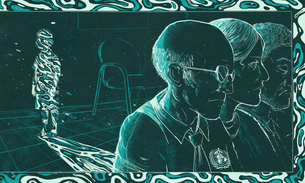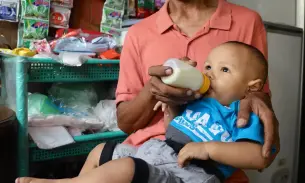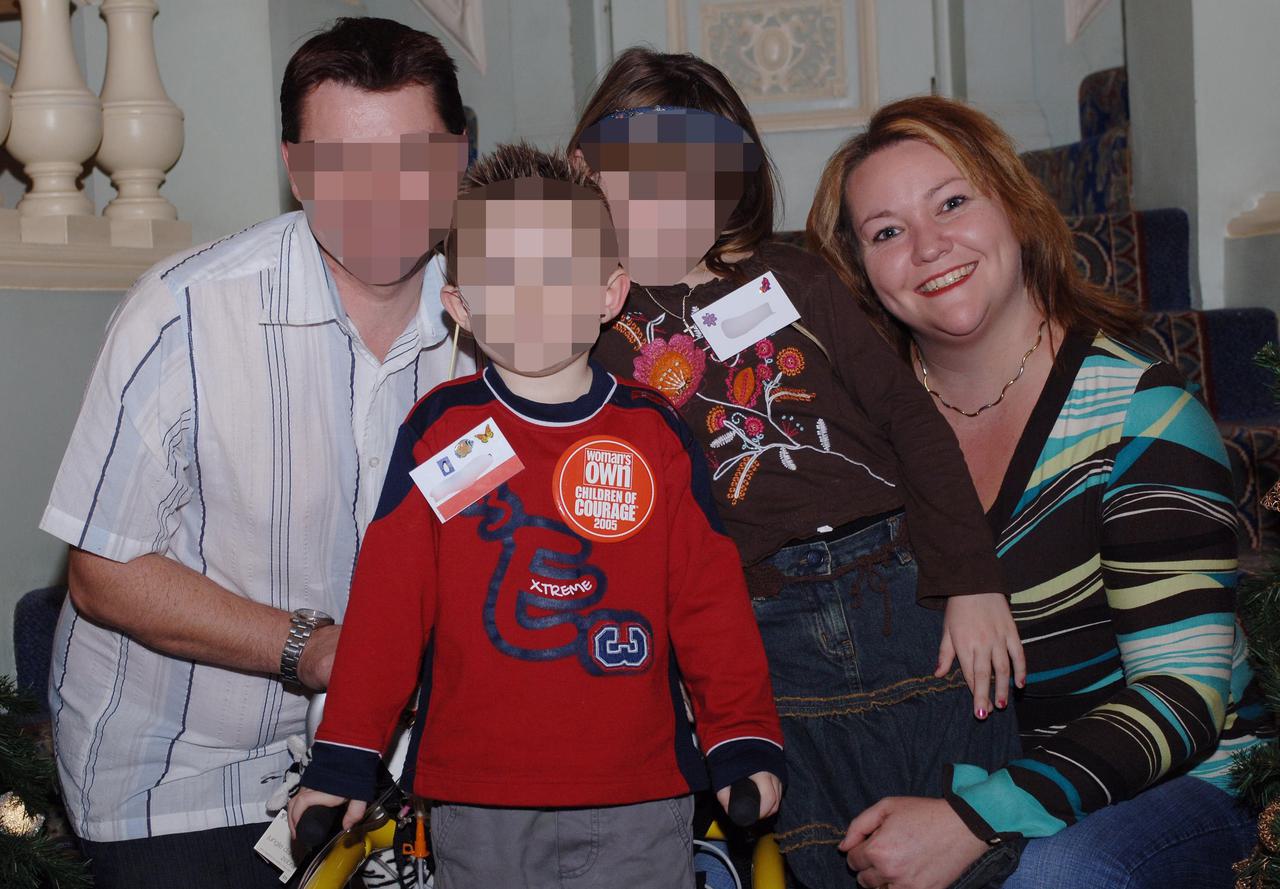
Concerns over fake illness cases in troubled GOSH department
This mother was jailed for child cruelty after persuading doctors - including at Gosh - to treat her children for non-existent illnesses
The story revealed by the Bureau on Sunday showed how a Great Ormond Street Hospital unit had misdiagnosed some children, leading them to believe they were very sick and in need of copious medication.
The Bureau can now reveal the same department’s past involvement in three major cases where parents had exaggerated or invented their children’s symptoms.
The children concerned, whose cases were identified as being ones of fabricated or induced illness (FII), were treated for allergic gut disorders by the hospital’s gastroenterology, or gastro, service between 2002 and 2013. They were all removed from their mothers after court hearings.
Despite the court scrutiny the question of how they were able to mislead experts at the country’s leading children’s hospital has never been fully answered.
Since 2013, there have been concerns that the gastro department’s ways of working may have left some children vulnerable as a result of parents who had given mistaken, exaggerated or fabricated accounts of their illness.
A series of reports and inquiries raised issues in the gastro department. The reports reflected more general concerns about management of some children at the hospital with symptoms doctors were unable to explain, known as “perplexing” cases. Issues raised included whether procedures were sufficient to keep children safe, a failure to adequately confirm the reports parents supplied about symptoms and an insufficient consideration of psychological factors. Some staff stated that they had felt too scared to report concerns.
GOSH says it has already made significant changes to its practices and has drawn up detailed plans for further action.
This is part of a series of Bureau articles looking at the gastroenterology department in Great Ormond Street Hospital
Find out moreOne mother, Lisa Hayden-Johnson, (pictured in the header photo) was jailed in 2010 for pretending her son was sick over a six-year period. Her son was under GOSH’s care since 2002 and was diagnosed with multiple food allergies. In 2005 he even featured in a news article about a then new “patient hotel” for families to stay at while their children were being treated at GOSH. The article referred to the four-year old receiving life-saving treatment at the hospital.
The boy repeatedly attended GOSH and other hospitals, was fed by a tube and attended school in a wheelchair, until a paediatrician elsewhere reviewed the boy’s medical files and became concerned that he had no clear diagnosis.
When police raided the mother's house, they discovered photographs of the child eating foods to which he was supposedly allergic.
Local authority safeguarding boards usually carry out a “serious case review” when a child has been seriously harmed and there are concerns about how different organisations worked together to protect the child. The local council involved said the case was given “detailed consideration”, but a decision was made not to carry out a serious case review.
This meant GOSH’s involvement was not scrutinised more widely.
Defining FII
In cases of fabricated or induced illness (FII) - previously called “Munchausen’s Syndrome by Proxy” - parents exaggerate, invent or cause symptoms in their children.
The Royal College of Paediatrics and Child Health, which issued guidance in 2009 and is presently in the process of being updated, and GOSH’s own expert Dr Danya Glaser, use the term FII to describe a spectrum of behaviour, which may or may not involve deliberate attempts to deceive doctors.
This spectrum ranges from those who deliberately induce or exaggerate illness in their charges to carers who have no intention to deceive but are over-anxious, may be mentally ill, or genuinely believe (due to misinformation) that the child is sick.
However there is no consensus on this definition and some experts only use the term FII where there is evidence of deliberate deception.
Because of the lack of an agreed definition, estimates of the incidence of FII also vary. The NHS’s official website describes it as rare.
 Lisa Hayden-Johnson, pictured outside Exeter Crown Court in 2010
Press Association
Lisa Hayden-Johnson, pictured outside Exeter Crown Court in 2010
Press Association
Make change possible
Investigative journalism is vital for democracy. Help us to expose injustice and spark change
Click here to support usThe second case also involved a boy, who must be known as Child X for legal reasons, who was treated by GOSH’s gastroenterology department for many years. There, he had been diagnosed with a rare allergy-related disorder - eosinophilic gastrointestinal disease - as well as problems with the movement of his gut. He was fitted with a feeding tube and a major surgical procedure was also performed on his intestine.
After the operation GOSH staff from a different department raised concerns.
In 2012 Child X’s parents moved him to a second hospital and then a third where, in April 2016, they were caught tampering with his feeding tube and were arrested. Child X was taken into care.
The police dropped charges against them but the Family Court ruled their son should remain in care, stating that the parents had misreported and exaggerated his gastrointestinal symptoms over many years.
They had exposed him to “significant harm at the most serious end of the spectrum, ultimately risking his life”, the judge ruled.
The Court heard there was no reason why the boy would not be able to eat and walk in the future. He was eventually returned to GOSH - this time, to a psychiatric unit there.
 Great Ormond Street Hospital at dusk
Juliet Nagillah/the Bureau
Great Ormond Street Hospital at dusk
Juliet Nagillah/the Bureau
The Bureau has also seen internal and external reports into a third case, in which a parent of a GOSH gastroenterology patient was found to have fabricated their symptoms.
In this case, a mother was jailed in 2016 for seven and a half years for fraud and child cruelty by inventing and exaggerating their illnesses to claim benefits. Two of the children were treated at GOSH before the mother’s arrest in May 2013.
GOSH asked an external expert to review the management of the cases while the local authority commissioned a “serious case review”. The expert review was critical of the management of Child G, the younger of the two, but said the other patient’s treatment was “exemplary”.
The reports show that Child G had been genuinely seriously ill as a baby, put on a nasal feeding tube by a local hospital and referred into GOSH in 2003 for “failure to thrive” and eating problems.
The referral was accompanied by warnings from the referring doctor and community mental health team that the mother’s account should be treated with care: the woman had “extreme anxiety”, was terrified her child was going to die of malnutrition and her accounts of her toddler’s feeding were contradicted by observations in clinic.
In 2004 Child G was investigated via endoscopy. This involves inserting a tube into the intestines to investigate their condition. Some eosinophils - white blood cells that can cause inflammation in high numbers - were found in some areas. A GOSH doctor prescribed anti-allergy and suggested anti-reflux medication which seemed to work and the patient gained weight.
A second set of tests in 2005 showed no significant abnormalities. The mother had raised concerns that the child had difficulties eating normally. The child was fitted with a stomach-feeding tube at GOSH. The child was discharged with a complex gastric disease diagnosis, known as EGID and “presumed GORD” (gastro-eosophageal reflux disease).
The external reviewer subsequently concluded that there had been no evidence to support the EGID diagnosis at that time and the patient should have been admitted for observation of symptoms.
Got a Story?
We welcome tip-offs from the public and we always protect our sources
Find out how to work with usIn February 2005 a GOSH doctor suggested an admission might be necessary after the mother reported that Child G “collapsed”, if not fed every three hours. The doctor started the child on two additional anti-allergy drugs.
Commenting on this, the reviewer said: “In my view it was imperative at this stage to organise a period of in-patient admission to justify both the variety of medications the child was receiving and to consider whether gastrostomy feeding was still necessary.”
But due to the mother’s refusal, no admission took place. The same GOSH doctor did refer Child G to eating disorder and mental health clinics but the patient was discharged due to failure to attend appointments.
Over the next nine years Child G made frequent visits to hospital, with reports of diarrhoea, pain and vomiting. Tests in 2007 found no evidence of significant eosinophilic gut disease. However, tube feeding was continued and G was left on a cocktail of six medications including Sulphasalazine - a powerful drug that can potentially affect blood cell count and damage the liver - as well as an antibiotic and antihistamines.
By 2009, the reviewer said “there was little justification for continuing the multiple drug therapy” and “the possibility of inappropriate management at home was obvious”.
The mother continued to block G’s admission to GOSH for observation or to undergo a mental health assessment. The consultant’s suggestions that the feeding tube be removed also came to nothing as both patient and mother insisted it was still necessary.
In May 2013, G was taken into care after a nurse visited the home and police found piles of unused medical equipment, food and medication there. The mother was arrested.
A month later G was taken off all medicines, eating a normal diet and looking “a picture of health”, according to the child’s file notes.
According to the independent experts who reviewed the case, G reported finding it “difficult to understand why, when doctors have such long training, they did not suspect what was happening”. G’s message to doctors was “involve the child more”, adding that the child did not build up a relationship with any of the doctors.
The fact that the children in the case were being treated in specialist clinics at centres of excellence meant other organisations found it more difficult to challenge their treatment.
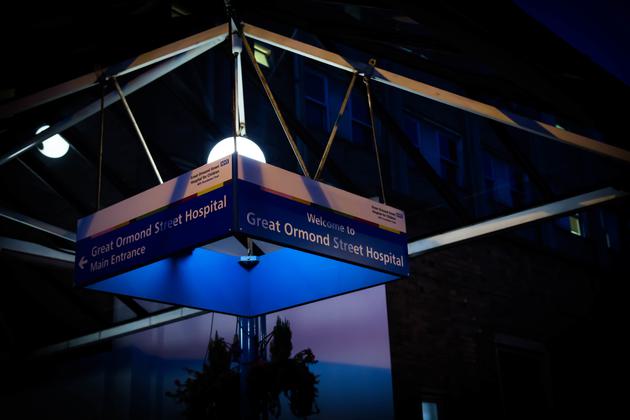 Close-up of the GOSH sign at its front entrance at night
Katharine Quarmby/the Bureau
Close-up of the GOSH sign at its front entrance at night
Katharine Quarmby/the Bureau
Doctors external to GOSH have echoed some of the concerns arising from the serious case review’s findings.
One consultant, who works at a district general hospital in the South East and who spoke on condition of anonymity, said he felt challenging experts at specialist centres was particularly difficult for provincial doctors. "A general paediatrician who suspects FII is in a lonely place.”
He also believed GOSH’s culture of referring patients to other specialists without reference back to the local paediatrician also gave FII parents increased scope to manipulate the system.
“There's nobody able to take a holistic view, so the patient or parent ends up calling the shots”, the paediatrician said. “This is fertile territory for a particular type of parent, who is able to manipulate all the different strands of healthcare.”
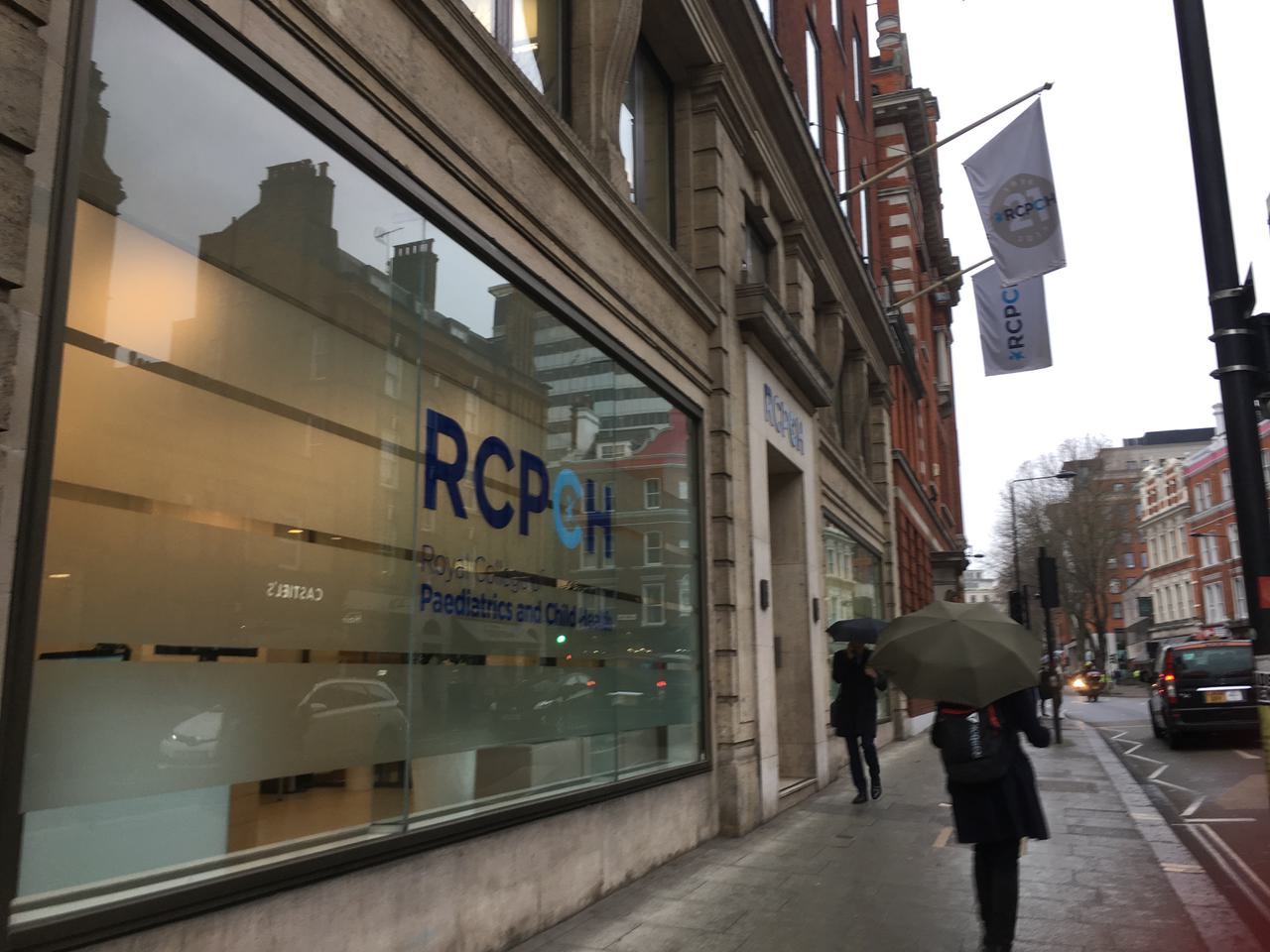
GOSH takes action
The case of Child G triggered action by GOSH, which introduced multi-disciplinary team (MDT) meetings later in 2013 to “better manage children with complex or perplexing presentations”.
In early 2015 the hospital asked the Royal College for Paediatrics and Child Health (headquarters pictured above) to review the gastroenterology department due to high levels of complaints and “unsolicited concerns” from inside and outside of the hospital. Two separate reports were subsequently produced in 2016 and 2017, which raised significant concerns about processes and procedures for keeping children safe in the gastroenterology department and in the hospital as a whole.
The Royal College team started work in mid 2015. Its first report, which has not been published but was completed a few months later, criticised a number of aspects of the department, including safeguarding, which is defined as protecting from harm. It described this as “insufficiently robust”.
“A number of staff at all levels expressed anxiety that children in need of protection may be missed by the inadequacies of the system”, it said, noting that there was “insufficient clinical psychologist support to the team and service”.
“The review team heard that sometimes consultants do not support each other or seek peer support when there are clinical concerns, such as fabricated or induced illness (FII)”, it added.
The hospital devised a plan to follow up the recommendations made by the Royal College’s team.
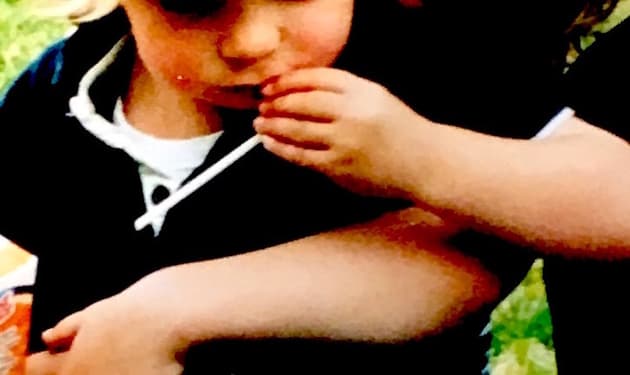 Stock image by Katharine Quarmby/the Bureau
Stock image by Katharine Quarmby/the Bureau
Concerns raised about half of the patients
Research within GOSH itself gives some idea of the extent of concerns there have been during the past few years over some families attending the gastro department for one condition.
In late 2015 GOSH staff published research about FII amongst children referred to the department with the same suspected gut disorder.
Of 78 patients referred, 35 had formal child protection plans in place, were suspected FII cases or staff had other concerns about them - mainly over treatment compliance and “ambiguity and reliability of reporting”.
Protecting children?
As the Bureau revealed earlier this week, the Royal College report led to reviews of the treatment of some children with rare allergic gut disease. The reviews found some children had been wrongly diagnosed and received unnecessary treatment.
The hospital put in place “complex care” multi-disciplinary team (MDT) meetings and asked for some patients to be admitted to the hospital as in-patients for observations and “food challenges”, in which allergic responses are tested.
A small number of parents whose children had been treated for allergic gut disease at GOSH for years were referred to social services in 2016 on suspicion of FII. But some families believe they were inappropriately referred.
A spokesman representing families of children with the allergic gut disease, some of whom have been subject to accusations of FII, feels GOSH could have been more transparent about over-treatment in the gastro department.
In his opinion, GOSH's “failure” to provide these families with maximum information had left them in a more vulnerable position. Other professionals had also sometimes had difficulties obtaining the fullest information from GOSH, which could give rise to safeguarding referrals, he claimed.
One mother told the Bureau she had been accused of FII by a different hospital "for following everything GOSH told me”. She had been unaware of the GOSH gastro review findings, she said, and now wondered if her child had been over-medicated.
A few mothers have dubbed the two week GOSH admissions “Munchausen’s Mums Watch”.
The Bureau has seen minutes of a 2016 MDT meeting, discussing a family, which says: “if the family refuses the plan for admission, the case will need to go down the Child Protection route. If the family insists on taking [the child] for another medical opinion, then it will also be Child Protection.” No action was taken against the family discussed.
Meanwhile the view expressed in the 2015 Royal College report that GOSH had not been protecting children adequately was reinforced by two further reports into safeguarding at the hospital.
One, completed in March 2016 by GOSH’s outgoing deputy medical director Dr Peter Lachman, was obtained by the Bureau via Freedom of Information Act requests.
He found that many children with medically unexplained symptoms - known as “perplexing presentations” were not being managed effectively across the hospital and staff with expertise in this area said these patients could “often be regarded as over-medicalised”. And although the gastroenterology team was amongst those that saw the most child protection-related cases in the whole hospital, it did not routinely discuss the cases with GOSH’s safeguarding experts or invite them to meetings when cases were discussed.
Only “a minority” of gastroenterology patients requiring multi-disciplinary team input were actually discussed at MDT meetings.
Dr Lachman also made wider criticisms of child protection at GOSH, saying procedures were inappropriate and record-keeping was “far below the standard required”.
GOSH’s board then commissioned a second report by Dr Geoff Debelle, the Royal College’s officer for child protection. His report, which was completed in April 2017, echoed some of Dr Lachman’s concerns. The “large numbers” of children with perplexing presentations in the hospital should be identified earlier and tracked through the hospital’s safeguarding system, he said.
 Stock image, by Shutterstock
Stock image, by Shutterstock
GOSH told the Bureau it had put in place detailed plans of action to implement the recommendations of both the Lachman and Debelle reports.
In summer 2017 the Royal College re-reviewed the gastro department, sending its findings to GOSH in January 2018. The College noted positive changes since the first report, including the appointment of a Named Doctor for child protection. More “perplexing” cases were being reviewed at multi-disciplinary team meetings, a database of more than 120 cases had been assembled, and there was increasing involvement in meetings by most - but not all - of the consultants. However the College also noted concerns by some staff that these meetings were “insufficiently effective or thorough”.
The team was also told “of patients requiring extensive psychological therapy who had undergone many years of invasive treatment thought to have been based on...fabricated symptoms”.
Some parents also remain unhappy, believing the hospital’s focus on FII may have gone too far.
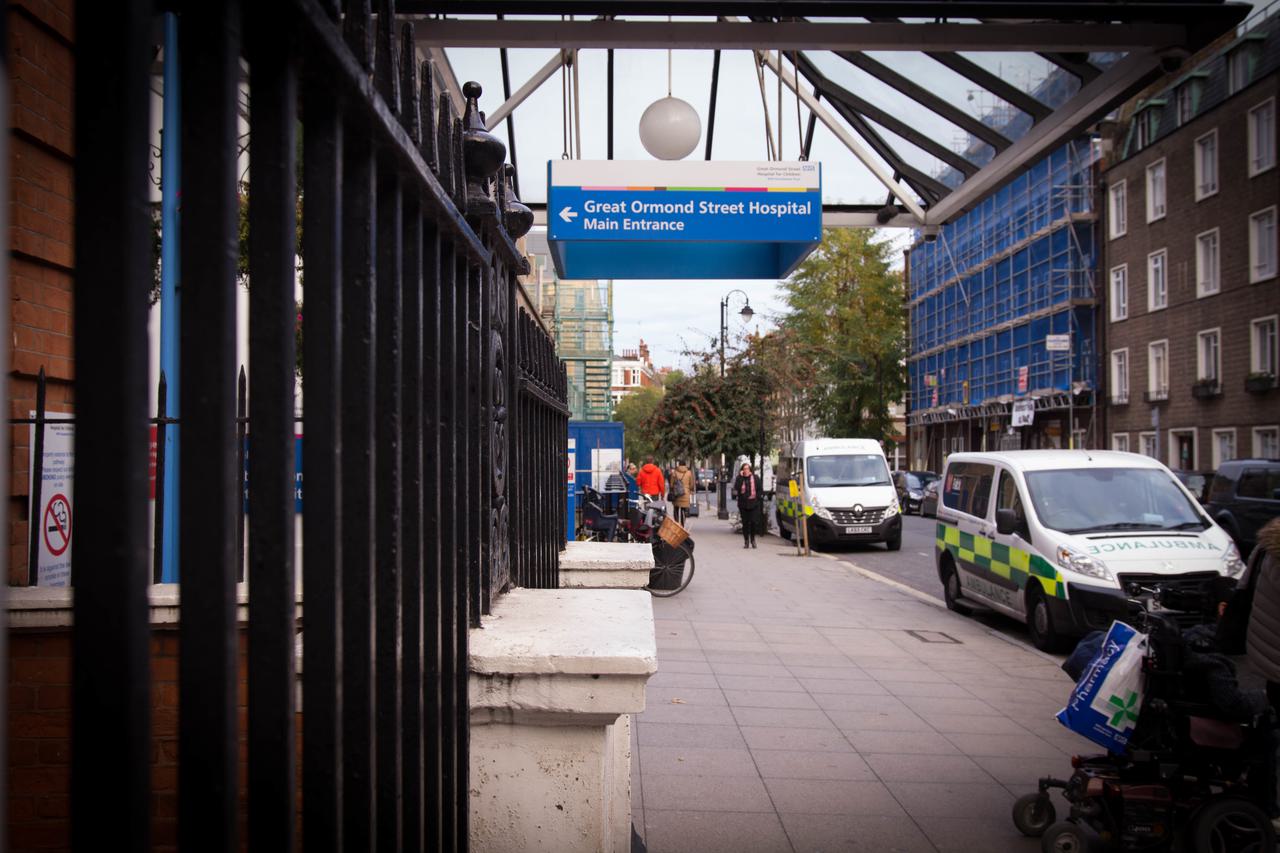
Managing tricky disorders
Any discussion of the FII phenomenon raises difficult questions about the management of complex, poorly understood disorders.
One child protection expert, who has advised on numerous FII cases, said that in their opinion too much focus on the parent’s behaviour - and the FII label itself - could potentially impede the fullest understanding of what had gone on. The expert has asked not to be named.
“FII is about unnecessary treatment instigated by the parent”, the specialist said. “But it’s hard to tell whether the parent was the instigator until you have also evaluated the doctor’s behaviour.”
Some parents do have abnormal responses to their children’s health for all sorts of reasons, including anxiety and learned behaviour from their own childhood, the expert said. “Some of those behaviours may be so entrenched and destructive that social services do need to intervene. But in general, blaming the parent for over-treatment is unhelpful.” In his view, “it is the doctor’s responsibility to recognise and manage those behaviours.”
Part of the difficulty can be that some doctors may avoid responsibility for convincing a parent that their child does not have a serious organic disease, the expert added. “If the local doctor cannot manage a parent’s anxiety, they will simply refer the family on to a more specialist hospital.”
“They will quite often be referred on and on until eventually they reach a ‘specialist’ who will diagnose that child with a serious disease and treat accordingly.”
The expert said that in his opinion, if other professionals raise concerns about a child, it is often the parent who goes to court, whilst the doctor is portrayed as a dupe.
GOSH’s interim medical director, Dr David Hicks, said: “FII is an extremely complex and rare condition and the vast majority of parents with children at GOSH are genuinely anxious for their children’s welfare.
Often children come to us after they have been seen and treated without success in other centres/hospitals [as appropriate], sometimes for long periods and with a range of different therapies and medication, and their parents’ anxiety is therefore acute.
GOSH recognises that clinicians, along with many other professionals in cases of children presenting perplexing symptoms, share responsibility for querying the accuracy of reported symptoms if appropriate, for taking further steps to validate symptoms, and in some rare cases for making safeguarding referrals.
It is the entire crux of FII that the children involved are vulnerable to over-treatment due to mis-reporting of symptoms by their parents. This is one reason why it is best practice that before starting more intensive medication that children are admitted for a period of observation (either to their local hospital or GOSH) to validate the problems that the family have reported.”
GOSH added, in a further statement: “Our approach to patient care at GOSH is a holistic one, and there is specialist psychological support throughout the hospital. Often children come to us after they have experienced limited improvements in their condition at other hospitals, sometimes being unwell for long periods and having experienced a range of different therapies and medication, and their parents’ anxiety is genuine, understandable and often severe. It is always our priority to protect patient confidentiality and, out of respect for the patients and their families we do not discuss the treatment or care of individual patients. However, we constantly look at how we can improve the way we work and, along with other agencies, protect the welfare of the children we treat, including those with the most perplexing symptoms.”
The Bureau of Investigative Journalism has been working in conjunction with Amazing Productions who produced “Great Ormond Street: The Child First and Always?” as part of the Exposure strand to be transmitted on ITV at 22.45pm on Wednesday 18th April.
Header image, by the Press Association, of the Hayden-Johnson family at the Children of Courage Awards, 2005


